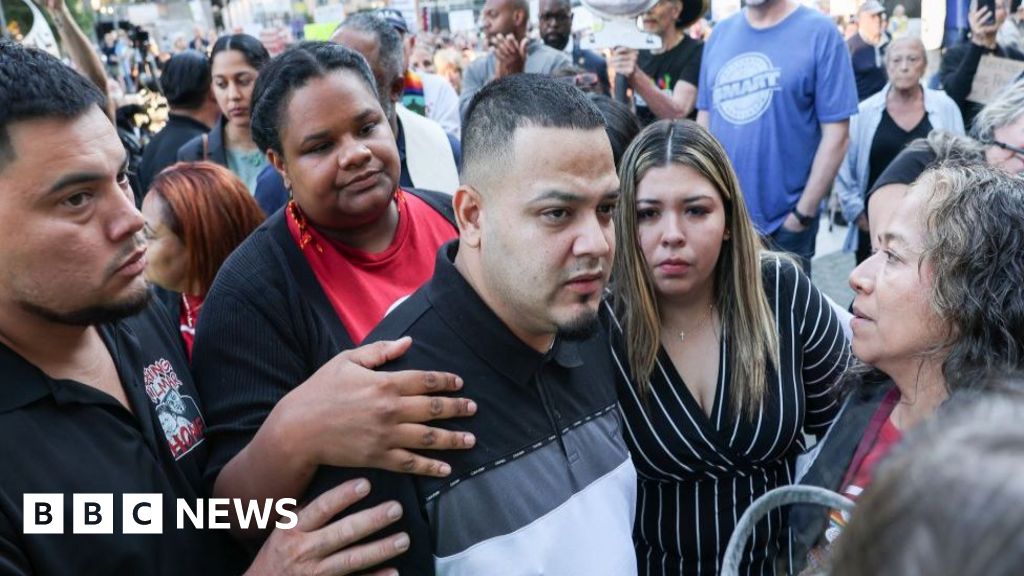A federal judge temporarily blocked the US government from deporting Kilmar Abrego Garcia to another country, after immigration officers took him into custody at a check-in this morning.
The government brought Mr Abrego Garcia back to the US after mistakenly deporting him to a notorious prison in El Salvador in March, and have since charged him with human trafficking.
US authorities told Mr Abrego Garcia he may be deported to Uganda, following his refusal to accept a plea deal, his lawyers say.
Mr Abrego Garcia filed a new federal lawsuit challenging his current detention and potential deportation “to Uganda or any other country” until he has a trial.
At Tuesday’s hearing, US District Judge Paula Xinis said she was barring the government from deporting Mr Abrego Garcia until she could hold a hearing on the matter.
She also raised questions about the government’s intention to deport him to Uganda.
She said the US failed to demonstrate that Mr Abrego Garcia would not face harm if deported to Uganda.
The judge also expressed concerns that the government would send him to a country where he had no connections, should he not plead guilty to criminal charges.
“It is in my view plain that you can’t do that,” Judge Xinis said. “You can’t condition the reliquishment of constitutional rights in that regard.”
“You’d never get a knowing and voluntary guilty plea out of anyone if you do that,” she said.
Two existing court orders bar the government from deporting him from the continental US until Wednesday afternoon.
“My understanding is that removal is not imminent,” government attorney Drew Ensign told Judge Xinis. He noted that “third country removal takes some time”.
Judge Xinis told Mr Ensign that the Trump administration was “absolutely forbidden” to remove Mr Abrego Garcia while those orders were in effect.
ICE is currently holding Mr Abrego Garcia at a facility in the state of Virginia, his attorney Simon Sandoval-Moshenberg told Judge Xinis.
He asked that the judge order his client remain detained within 200 miles of the court in order to ensure he had swift access to his legal proceedings.
Judge Xinis asked both parties to submit briefs this week ahead of a potential hearing. She is the same jurist who oversaw the initial lawsuit over Mr Abrego Garcia’s mistaken deportation to El Salvador.
On Monday morning, US Immigration and Customs Enforcement (ICE) took Mr Abrego Garcia into custody after summoning him to a mandatory immigration meeting in Baltimore.
Before going inside, Mr Abrego Garcia addressed a crowd of supporters and protesters gathered outside the building.
“Brothers and sisters, my name is Kilmar Abrego Garcia,” he said. “And I always want you to remember that today, I can say with pride, that I am free and have been reunited with my family.”
He was back in custody shortly after.
In a statement, Secretary of Homeland Security Kristi Noem confirmed his arrest and said that ICE “are processing him for deportation”.
In a subsequent post on X, the Department of Homeland Security said “he will be processed for removal to Uganda”.
The Trump administration spent much of the day alleging Mr Abrego Garcia was a criminal as justification for his latest action. The official White House X account posted an stylised image of Mr Abrego Garcia with the slogan “MS-13” appearing in bold letters beneath his face.
In a statement, Ms Noem alleged Mr Abrego Garcia was guilty of human trafficking and domestic abuse. President Donald Trump would not allow him to “terrorise American citizens any longer”, she said.
Mr Abrego Garcia’s legal team accuses the US of trying to “coerce” him to plead guilty by threatening to re-deport him “halfway across the world”.
“The only reason that they’ve chosen to take him into detention is to punish him, to punish him for exercising his constitutional rights,” Mr Sandoval-Moshenberg told reporters outside the ICE office.
A subsequent court order barred the government from removing Mr Abrego Garcia from the continental United States or altering his legal status until 16:00 Wednesday, unless a judge extends the order.
His lawyers said their client declined an offer to plead guilty to human smuggling charges in exchange for deportation to Costa Rica. He was asked to check in on Monday at the field office in Baltimore.
During the interview, Mr Sandoval-Moshenberg said ICE officers had taken Mr Abrego Garica into custody with no explanation. An officer told the attorneys he would be taken to a detention centre but would not specify which one.
His attorney argued there was no reason to detain Mr Abrego Garcia, as he was under ankle monitoring and “basically on house arrest”.
The US reached bilateral deportation agreements with Honduras and Uganda as part of the Trump crackdown on illegal immigration.
Uganda’s ministry of foreign affairs announced last Thurdsay that it had reached a temporary agreement with the United States with respect to “third country nationals who may not be granted asylum in the United States but are reluctant to or may have concerns about returning to their countries of origin”.
However, Uganda stated a preference to take individuals from African countries, and said it would not take individuals with criminal records or unaccompanied minors.
The saga of Mr Abrego Garcia’s deportation case has been in the news since March when he was deported to his native El Salvador despite a court order blocking such action, and initially kept in the notorious Cecot prison.
But after US government officials acknowledged he was deported due to an “administrative error”, a judge ordered the administration to facilitate his return.
He was sent to Tennessee where he was charged in a human smuggling scheme and detained until his release on Friday after a ruling by a federal judge.
Mr Abrego Garcia has pleaded not guilty to the charges.

